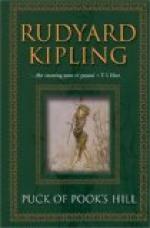They settled themselves, as usual, on the sack-strewn cot in front of the fires, and, when Hobden drew up the shutter, stared, as usual, at the flameless bed of coals spouting its heat up the dark well of the old-fashioned roundel. Slowly he cracked off a few fresh pieces of coal, packed them, with fingers that never flinched, exactly where they would do most good; slowly he reached behind him till Dan tilted the potatoes into his iron scoop of a hand; carefully he arranged them round the fire, and then stood for a moment, black against the glare. As he closed the shutter, the oast-house seemed dark before the day’s end, and he lit the candle in the lanthorn. The children liked all these things because they knew them so well.
The Bee Boy, Hobden’s son, who is not quite right in his head, though he can do anything with bees, slipped in like a shadow. They only guessed it when Bess’s stump-tail wagged against them.
A big voice began singing outside in the drizzle:
’Old Mother Laidinwool had nigh twelve months
been dead,
She heard the hops were doin’ well, and then
popped up her head.’
‘There can’t be two people made to holler like that!’ cried old Hobden, wheeling round.
‘For,’ says she, ’The boys I’ve picked with when I was young and fair, They’re bound to be at hoppin’, and I’m——’
A man showed at the doorway.
‘Well, well! They do say hoppin’ ’ll draw the very deadest, and now I belieft ’em. You, Tom? Tom Shoesmith?’ Hobden lowered his lanthorn.
‘You’re a hem of a time makin’ your mind to it, Ralph!’ The stranger strode in—three full inches taller than Hobden, a grey-whiskered, brown-faced giant with clear blue eyes. They shook hands, and the children could hear the hard palms rasp together.
‘You ain’t lost none o’ your grip,’ said Hobden. ’Was it thirty or forty year back you broke my head at Peasmarsh Fair?’
‘Only thirty, an’ no odds ‘tween us regardin’ heads, neither. You had it back at me with a hop-pole. How did we get home that night? Swimmin’?’
‘Same way the pheasant come into Gubbs’s pocket—by a little luck an’ a deal o’ conjurin’.’ Old Hobden laughed in his deep chest.
‘I see you’ve not forgot your way about the woods. D’ye do any o’ this still?’ The stranger pretended to look along a gun.
Hobden answered with a quick movement of the hand as though he were pegging down a rabbit-wire.
‘No. That’s all that’s left me now. Age she must as Age she can. An’ what’s your news since all these years?’
’Oh, I’ve bin to Plymouth, I’ve bin to Dover— I’ve bin ramblin’, boys, the wide world over,’
the man answered cheerily. ’I reckon I know as much of Old England as most.’ He turned towards the children and winked boldly.
‘I lay they told you a sight o’ lies, then. I’ve been into England fur as Wiltsheer once. I was cheated proper over a pair of hedgin’-gloves,’ said Hobden.




